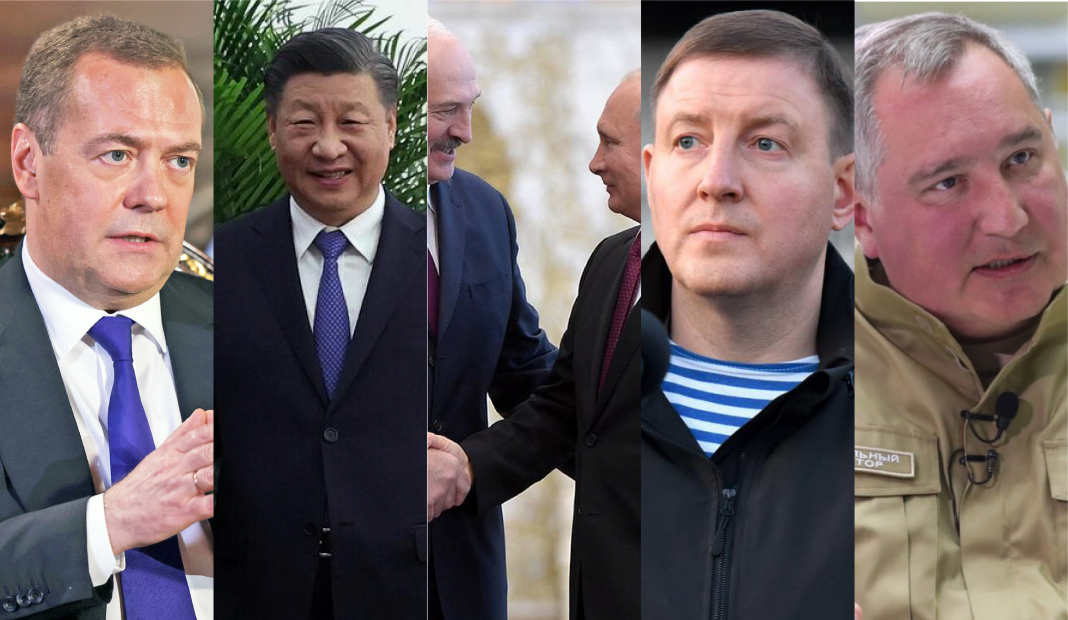This report describes the key events that had an important impact on the political, economic and social processes inside Russia.
Based on the results of the past week, the following key events can be brought to attention:
- Russia is preparing for further escalation with the West. Despite the intensification of the crisis processes within the country, an aggressive foreign policy remains the Kremlin’s priority for 2023. Putin’s visit to Minsk demonstrates his readiness to expand integration processes and unleash new conflicts. Moreover, a direct confrontation with NATO is becoming more and more likely.
- Moscow aims to strengthen relations with Beijing further. The prospects for creating a military alliance may be updated as early as the beginning of 2023, which is undoubtedly a positive signal for Moscow. On the other hand, the Chinese leader’s tacit approval of Russia’s actions towards Ukraine and Europe demonstrates negative trends for the West. At the same time, it is worth considering the factor of serious crisis processes that are increasingly covering China. On the one hand, this may interfere with the plans of Moscow and Beijing. On the other hand, the crisis in China will launch similar processes worldwide and dramatically impact the global economy.
- Preparations for the transition of power continue in Russia. The appointment of Andrei Turchak, the energisation of Dmitry Medvedev, and several statements made by individual politicians demonstrate the Kremlin’s attempts to confuse the cards and offer several contenders for the title of “receiver” at once. At the same time, regional competition is intensifying. The positions of Ramzan Kadyrov and several other influential figures in Putin’s inner circle may be shaken shortly.
During December 19–25, the following topics were the most relevant for Russia:
1. Vladimir Putin’s visit to Minsk
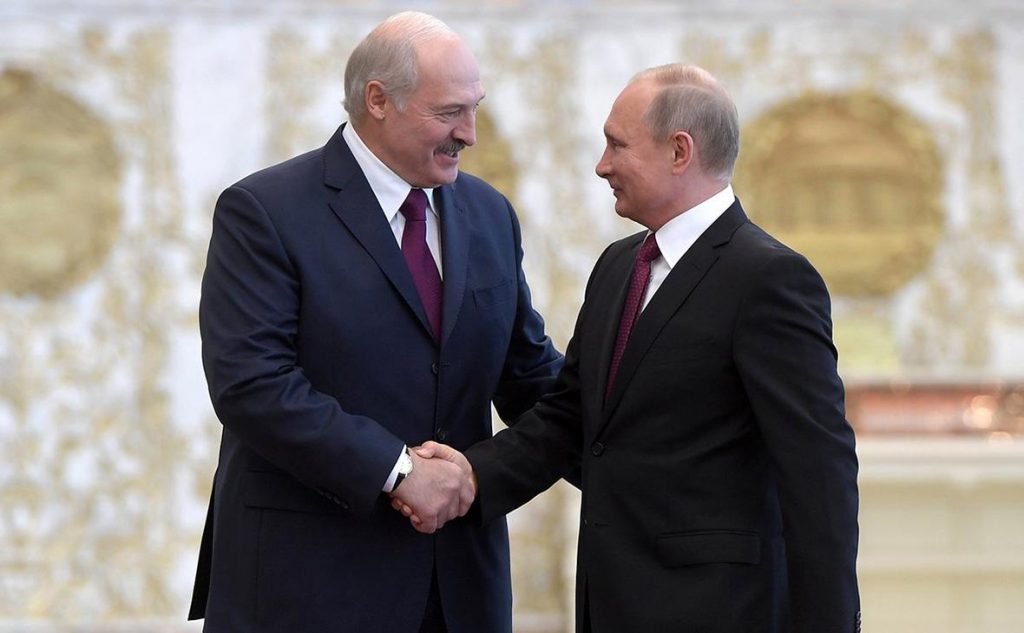
On Monday, December 19, Vladimir Putin arrived on a scheduled visit to Minsk, where he held talks with Alexander Lukashenko, which lasted two and a half hours. Also, he took part in a security meeting with relevant leaders. Also, with Putin, Russian Foreign Minister Sergei Lavrov and Russian Defense Minister Sergei Shoigu arrived in Minsk. Some sources suggested that after Putin visited Minsk, which he made for the first time in the last three years, the leaders of the two states could agree to open another front against Ukraine by getting Belarus into the war. However, the agenda of the meeting dealt with entirely different topics.
Timeline:
- On December 19, the Ukrainian command announced that Putin and Lukashenko “will work out the issues of further aggression against Ukraine and a wider involvement of the armed forces of the Republic of Belarus in operation against Ukraine.”
- The Ministry of Defense of Belarus announced the completion of a check on the combat readiness of its troops, which began about a week ago.
- The Russian Ministry of Defense stated that the exercises of mobilised Russians at the training grounds in Belarus are going on non-stop: “From early morning until evening twilight, there is not a single second of silence at the training grounds of Belarus … Fire is fired from all guns, deafening everything around.”
- Russian presidential spokesman Dmitry Peskov called reports that Putin is visiting Lukashenko to discuss a new attack on Ukraine, “stupid and baseless.”
- Lukashenko personally came to meet Putin at the airport in Minsk.
- Spokesman for German Chancellor Steffen Hebestreit said that Berlin worries that after the meeting between Putin and Lukashenko, Belarus will expand its participation in Russia’s war against Ukraine.
- Peskov: “Today, at the talks between Putin and Lukashenko, there will be an opportunity to talk about military issues, given the turbulence.”
- Peskov advised the Commander-in-Chief of the Ukrainian troops Zaluzhny to “have a rest” after his statements that Moscow and Minsk are preparing a joint operation: “What is the name of the general? He needs to chill out. He overworked.”
- Lukashenko expressed hope that soon it will be possible to move on to a constructive discussion with Europe on security issues and the future world order.
- Lavrov: “the “SMO” was essential to thwart plans to turn Ukraine into “anti-Russia”.
- Lavrov said that there would be a long era of transition to multipolarity; it would not be simple. But, according to him, the main result of the year is that “the situation has finally become clear: “who can be trusted, who cannot”.
- Putin: “It seems to me that today’s meeting was very productive.”
- Lukashenko: “I think people will appreciate the decisions that we have made here today and on the strategy.”
- The Russian president said that all “sensitive” issues on oil and gas supplies were resolved at a closed meeting with Lukashenko.
- Lukashenko confirmed that Belarus already has planes capable of carrying “special munitions”.
- Putin instructed to continue work on the legal assessment of the actions of the Nazis during the Great Patriotic War and the organisation of trials. It was also ordered to include materials on the genocide of the Soviet people by the Nazis during the Second World War in federal education programs.
- Putin: “The Russian Federation and Belarus are effectively and jointly fighting sanctions.”
- Putin said that he had discussed price parameters in the energy sector with Lukashenko, and everything was agreed upon.
- Putin: “The Russian Federation and Belarus have agreed to continue the practice of joint military exercises.”
- Putin: “The Russian Federation and Belarus have agreed to develop new military equipment.”
- Lukashenko believes that “the stamping of sanctions against Minsk and Moscow is beginning to fade, and the restrictions have hurt their initiators.”
- Lukashenko said that instructions had been given to the Russian Federation and Belarus governments to finalise the program to create a single gas market.
- Putin about the rumours about the “absorption” of the Russian Federation of Belarus: “Russia has no interest in absorbing anyone; there is no expediency in this.”
- Lukashenko said, “in fact, the negotiations with Putin created a basis for the future breakthrough of the Russian Federation and Belarus forward.”
- Lukashenko: “Belarus put on duty the Iskander and S-400 complexes transferred by the Russian Federation.”
- Lukashenko said, “Minsk is satisfied with gas pricing conditions for the next three years, and the price of Russian gas for next year is fixed and profitable for Belarus”.
- On December 20, the day after the talks between Putin and Lukashenko, the Belarusian prime minister announced the price of Russian gas for Minsk in 2023, which the leaders of the two countries had agreed on, was based on the Belarusian proposal.
Conclusions and outlooks:
Despite many predictions about Belarus’ entry into the war against Ukraine as the main result of Putin’s visit, the joint press conference of the two leaders was devoted to completely different issues. At the same time, it should not be denied that the opening of the Belarusian front can still occur under the conditions of significant defeats of the Russian occupation forces in the east of Ukraine.
On the other hand, it is important to note that the leaders of Russia and Belarus have something to discuss without the Ukrainian issue. According to Ascolta, the main topic of the talks was the threat of inciting a new conflict on the western borders of Belarus. Allegedly, closer to April 2023, the Belarusian side fears provocations from Poland and the Baltic countries related to the Belarusian nuclear power plant. Therefore, under the pretext of protecting the territory of Belarus from a possible military conflict with NATO member countries, during the meeting between Putin and Lukashenko, the idea of amending the nuclear doctrine of the Russian Federation was discussed, according to which Moscow would be able to place nuclear weapons on the territory of Belarus. Also, according to available information, soon, Moscow plans to deploy (at least) two more military bases on the territory of Belarus.
It is important to note that during a joint press conference following the meeting, information was announced that Belarus had put the Iskander and S-400 complexes transferred by the Russian Federation on duty and that Belarus already has aircraft that are capable of carrying “specific ammunition” (apparently, we can talk about both hypersonic missiles and nuclear warheads).
At the same time, it is worth noting that talks about the deterioration of relations between Putin and Lukashenko have recently intensified. Allegedly, this is happening against the fact that the Belarusian president refuses to participate in the war against Ukraine. In this situation, it is essential to note that despite the well-established stereotype of Minsk’s overdependence on Moscow, many do not consider the Beijing factor, which is decisive in relations between the two states. In fact, China is the leading investor in the Belarusian economy, and Xi Jinping has repeatedly noted that he maintains close ties with Lukashenka, giving the latter room for manoeuvre.
Moreover, a few days before Putin’s visit, Lukashenka appointed Sergei Aleinik as Foreign Minister of the Republic of Belarus (Ascolta wrote more about him here), who is closely connected with the Vatican and has extensive ties in the UK. This appointment can hardly be called the most beneficial for Moscow.
On December 25, the Apostolic Nuncio to the Republic of Belarus, Archbishop Ante Jozic, said that Belarus could again become the centre of negotiations and contribute to peace in Ukraine: “I am sure Minsk can become the centre of negotiations again. I assume that there are such movements at a high level. I want to emphasize that both Belarus and the Vatican, and all those who want to become a platform, must be open.” Considering that this statement has already been voiced before, it can be assumed that such a negotiation format is indeed being discussed at the highest level. Both Moscow and the West may be interested in its promotion. In this case, a completely different role may be assigned to Belarus in ending the war.
2. Visit of the Russian delegation headed by Dmitry Medvedev to China
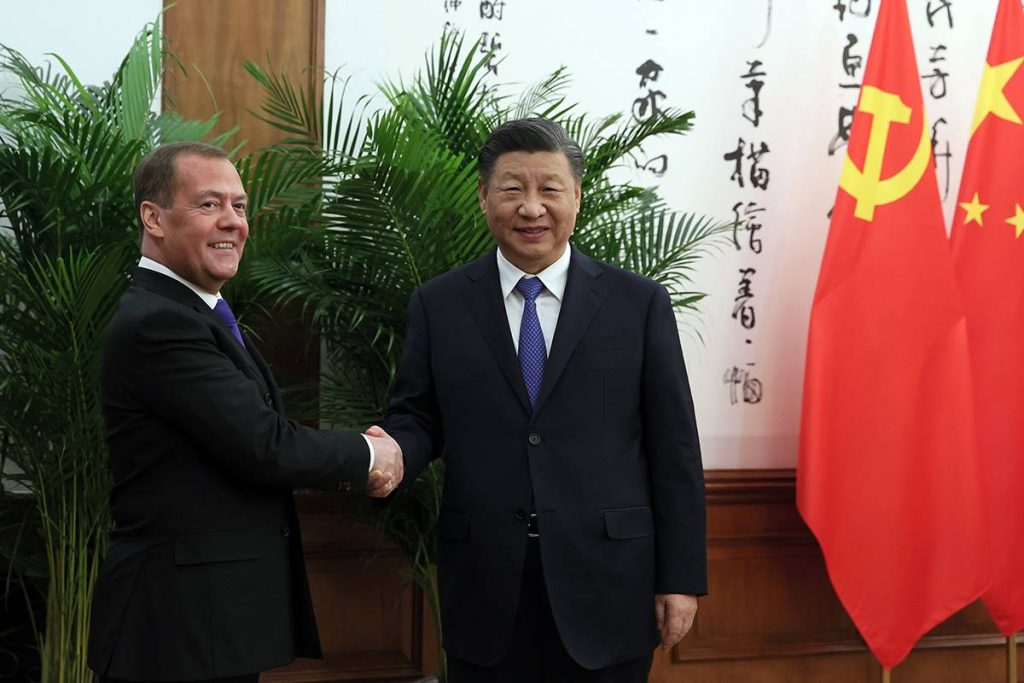
On Tuesday, December 20, Deputy Chairman of the Security Council of the Russian Federation, Dmitry Medvedev, arrived in Beijing as the head of the “Yedinaya Rossiya” delegation. It included the Secretary of the party’s General Council, First Vice Speaker of the Federation Council Andrey Turchak and Head of the “Yedinaya Rossiya” faction in the State Duma Vladimir Vasiliev. The official visit took place at the invitation of the CPC Central Committee. Medvedev’s talks with the Chairman of the People’s Republic of China, General Secretary of the CPC Central Committee, were the first face-to-face meeting between the leaders of the two ruling parties of Russia and China since the beginning of the pandemic. According to Medvedev himself, during the talks, the politicians discussed “strategic partnership”, “industrial cooperation”, and “broad convergence of approaches” between Russia and China, the war in Ukraine and cooperation between “Yedinaya Rossiya” and the Communist Party of China. There was also information that during the meeting, Medvedev gave Xi Jinping a secret message from Putin, the contents of which were not disclosed. The visit of the Russian delegation to China lasted two days (December 20-21).
Timeline:
- On behalf of “Yedinaya Rossiya”, Medvedev congratulated the President of the PRC on the success of the 20th Congress, his re-election as General Secretary, and the formation of a new CPC Central Committee.
- Medvedev conveyed Putin’s message to Xi Jinping, which, in particular, notes the unprecedented level of Russian-Chinese political dialogue and practical cooperation, expresses confidence in the constant progressive development of interstate and inter-party ties in close cooperation with the new leadership of the CPC, elected following the recent party forum of Chinese communists.
- Xi Jinping stated, “China is willing to work with Russia to push forward bilateral relations in a new era continuously and jointly promote the development of global governance in a more just and reasonable direction.”
- Xi Jinping on Ukraine: “China urges the parties involved to maintain reason and restraint, engage in comprehensive dialogue and use political methods to resolve their security concerns.”
- Medvedev on Ukraine: “The Ukrainian crisis has its causes and is very complicated.” “Russia is ready to solve its problems through peaceful negotiations.”
Conclusions and outlooks:
Despite several official statements following the meeting between Medvedev and Xi Jinping, it can be assumed that the main goals of the visit remained behind the scenes. At the same time, the visit itself is yet another proof that relations between China and Moscow are developing and strengthening, which signals negative trends for both the West and Ukraine.
Judging by many statements, one of the main issues discussed during the meeting between Medvedev and Xi Jinping concerned the energy sector and new pricing conditions for Russian energy carriers after the introduction of a “price ceiling” by Western states on Russian oil and gas. Apparently, shortly, we will see several statements both on reaching new agreements in the field of energy exports and on launching new projects in the area of energy and infrastructure.
It is also worth remembering the visit of the Secretary of the Security Council of the Russian Federation Nikolai Patrushev to Beijing, which took place on September 19. As a result, some streamlined statements were also made without any specifics, which gave reason to talk about the cooling of relations between Moscow and Beijing. At the same time, according to Ascolta sources, due to the visit, the number of residents of the Russian intelligence services in Europe was seriously reduced, and Chinese colleagues took their place. Moreover, Russia has given China access to all intelligence regarding the European region. Due to Medvedev’s visit, non-public agreements were also reached to expand China’s non-public presence in Europe.
It is important to note that the Ukrainian issue was also discussed during the meeting. First, both sides in public statements used the wording “Ukrainian crisis”. Also, they stated the need for a negotiation process, although Medvedev was less specific in his reasoning about peace negotiations. Nevertheless, one gets the impression that China is ready to participate more actively in resolving the Ukrainian issue.
Second, Medvedev’s visit coincided with Volodymyr Zelensky’s visit to Washington, where he met with Joe Biden and addressed Congress. Of course, for the Russian consumer, it was possible to partially interrupt the news background and minimize the potential negative from the Ukrainian agenda, but this can hardly be considered the primary purpose of the visit.
Thirdly, it is also essential that it was Medvedev who went to meet with Xi Jinping. Recently, he has made several extremely radical statements about Ukraine and the West, which helped to form his image as the leading supporter of the use of nuclear weapons and a confrontation with NATO. Medvedev’s visit to Beijing clearly hinted to the West that Russia is ready to take more radical measures, and Medvedev’s ideas are not alien to the Kremlin.
In any case, the deepening of bilateral cooperation between Moscow and Beijing should be expected soon. Putin’s main goal is to create a military alliance between the two states. Still, the Chinese leader is delaying such a decision in every possible way, leaving ample room for manoeuvre. At the same time, it should be borne in mind that in China, the power formation process has not yet ended. According to some reports, Xi Jinping plans to visit Moscow in April 2023, during which a document on a military alliance will still be agreed upon. In this case, the West risks facing a severe crisis in the form of a new military alliance, which is a real threat to both NATO and the entire Western democracy.
In this context, it is worth paying attention to the statement of Chinese Foreign Minister Wang Yi, who on December 24 stated that Russia’s war in Ukraine did not affect relations between Moscow and Beijing: “Relations maintained between China and Russia are solid as a monolith. They are not subject to interference and provocations; they are not afraid of major changes in the situation.” According to him, “PRC and Russia stand firmly against hegemony and the new cold war.” He also announced the growth of trade and the expansion of settlements without the participation of the dollar and the euro.
3. Board of the Ministry of Defense of the Russian Federation
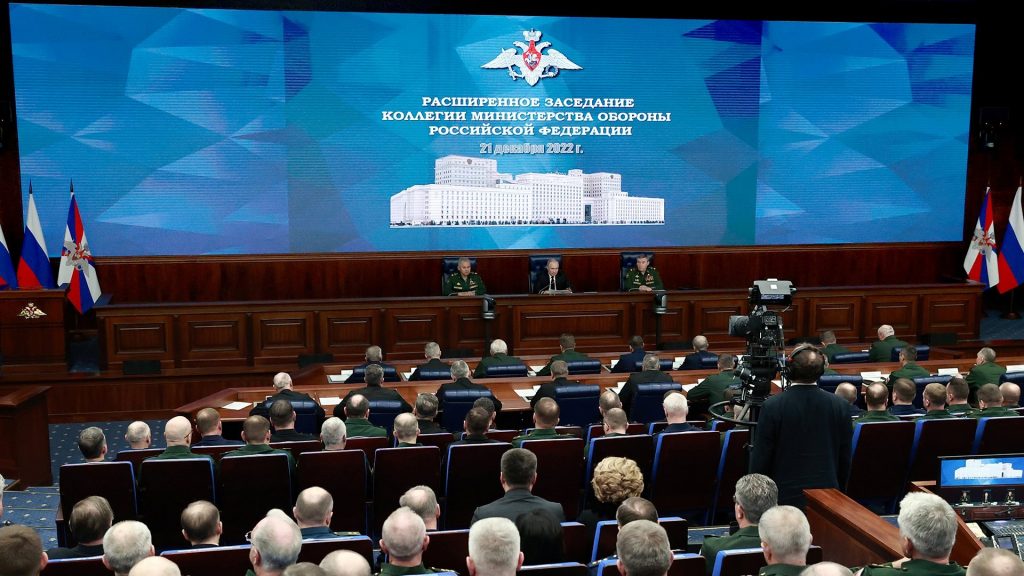
On Wednesday, December 21, a Russian Ministry of Defense collegium was held. Vladimir Putin took part in it, making several statements about the so-called “SMO” and the situation in the armed forces of the Russian Federation. Also, some remarks were made by the Minister of Defense of the Russian Federation, Sergei Shoigu, who focused mainly on the internal problems of the army.
Putin’s key theses:
- “Information about NATO forces and armaments should be analysed and used for the development of the Russian armed forces, as well as the vast experience gained by the units during the “special operation.”
- “In January, the Admiral Gorshkov battleship will enter combat service with the latest Zircons.”
- Putin announced the need to develop and use drones in the army, “they should be everywhere.”
- “Officers and sergeants who gained experience during the “special operation” should be assigned to new positions as a matter of priority.”
- “Our military must have everything at the highest level, including weapons, night vision devices, there cannot be trifles on the battlefield, first-aid kits, uniforms, shoes – everything must be at a high level, modern and reliable.”
- Putin drew the attention of the Ministry of Defense that there are no restrictions on the financing of the army – “the country provides everything that the military needs.”
- “Russia has good experience developing underwater drones, and the industry can build air and ground drones.
- “Artificial intelligence technology should be used at all levels of decision-making.”
- “300,000 people have been drafted into the ranks of the armed forces, 150,000 of them are training at the training grounds, and this is a sufficient reserve for conducting an operation.”
- “After the collapse of the USSR, Russia wanted to become part of the “civilised” world, but we were not expected there.”
- “I still consider the Ukrainian people to be fraternal.”
- “We will not engage in the militarisation of the country and the economy.”
Shoigu’s key theses:
- “The priority task of the Russian Federation for 2023 is to continue the “special operation” until the “complete fulfilment of its goals”.
- “Because of the build-up of NATO forces, Russia needs to create a grouping of troops in the northwest of the country.”
- “It is necessary to create two strategic territorial associations of the armed forces – the Moscow and Leningrad military districts.”
- “It is necessary to form new divisions in the Kherson and Zaporizhzhia regions and army corps in Donetsk and Lugansk.”
- “Step by step increase the age of conscription of citizens from 18 to 21 years, and raise the limit to 30 years”.
- “It is necessary to increase the size of the Russian army to 1.5 million people, including 670,000 contract soldiers.”
Conclusions and outlooks:
By the end of the year, the Russian president is trying to pay more and more attention to the so-called “special military operation”, which was supposed to end on February 27, but, apparently, will be extended indefinitely. But, of course, it was not 301 days of hostilities that became the reason for such a massive event. Especially since earlier Putin managed to visit the headquarters of the united military branches, talk in the Kremlin with the so-called leaders of the so-called “republics”, and also, according to Peskov, visit the so-called “SMO”.
Putin’s speech at the collegium of the Ministry of Defense of the Russian Federation Ascolta is analysed here.
Generally, Putin’s speech can be reduced to several main theses:
- In the coming years, the world will be restless, but Russia is ready for new wars. At what, how to start and finish them, defending their own interests.
- Russia has learned from its mistakes in the so-called “SMO” and will try to correct them soon.
- Ukraine is still seen as a fraternal people but is now more prosperous as a military testing ground for new types of weapons. But if anything, the West is to blame for everything.
According to Ascolta, Russia expects a severe escalation of relations between Belarus and Poland, which could lead to the emergence of a new hot spot in Eastern Europe. This issue became one of the key ones during Putin’s recent visit to Minsk and meeting with Lukashenka. Also, Serbia and Armenia are considered among the potential sources of unrest. In this case, Putin’s “militarization” is an attempt to demonstrate readiness for turbulent times and begin to form a conditional military bloc that claims leadership in the new conditions.
At the same time, with his speech, Shoigu, in fact, is trying in every possible way to shift the focus from the failures in the so-called “SVO”. At the same time, the main theses come down to the following: firstly, Russia will not abandon its plans for Ukraine and is ready to use all the necessary forces to achieve them. Secondly, Shoigu makes it clear to the West that Russia is prepared for a direct clash with NATO in case of further escalation and unwillingness to agree to Moscow’s terms.
As of now, such statements (both Putin and Shoigu) are nothing more than an attempt to once again push through their negotiating position. But, if the answer does not follow, soon, the world may face a more global threat that will concern not only Ukraine but also a significant part of Europe.
Shortly, one should follow the actions of both the United States and China, whose positions will be decisive for the security of Europe and Ukraine and for curbing Russia’s aggressive ambitions.
4. Appointment of Andriy Turchak as the Head of the Parliamentary Coordinating Group on the so-called “SMO”
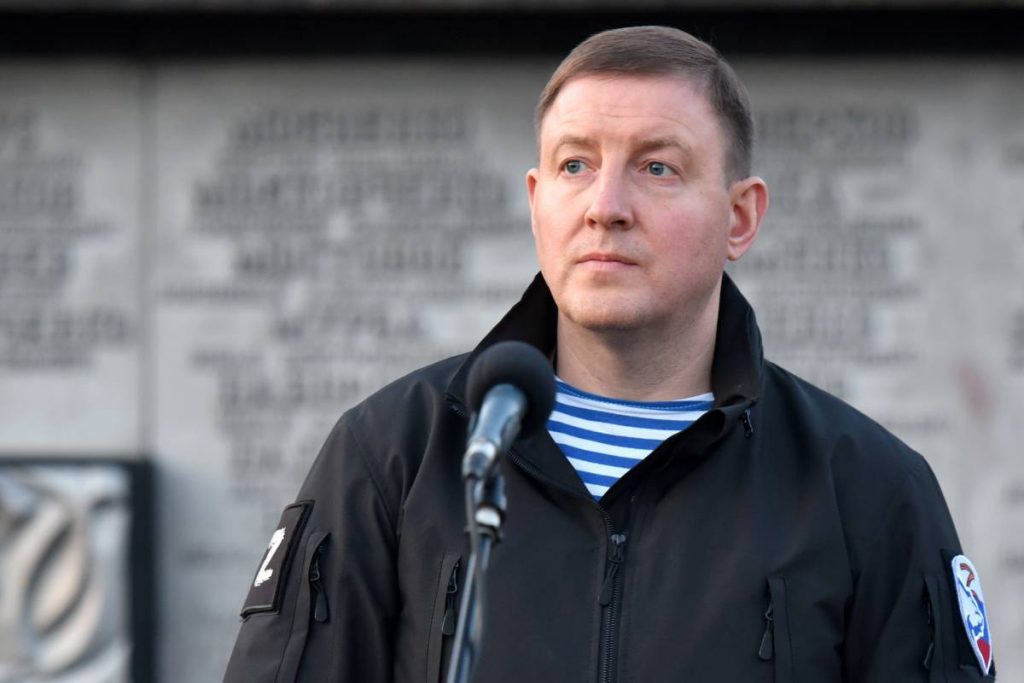
On Saturday, December 24, Andrey Turchak, First Deputy Chairman of the Federation Council of the Federal Assembly of the Russian Federation, was appointed the Head of the parliamentary coordinating group on the so-called “SMO”. This group was formed by order of Putin and, as stated, should become a tool for him to obtain objective information from the front line. Furthermore, it will constantly monitor the provision of mobilized citizens and several other issues related to the so-called “SMO”.
Conclusions and outlooks:
The appointment of Andrei Turchak is another step towards the strengthening of “Putin’s favourite” in the domestic political landscape. Turchak had previously demonstrated independence, entered into a confrontation with Sergei Kiriyenko, and sometimes contradicted Sergei Shoigu, especially regarding his attitude towards the so-called “SMO”. The status of “the son of a close friend of Putin” turned out to be quite weighty.
After Kiriyenko’s concept of “immediately annexing all conquered territories, fixing their status in the Constitution” led to a dead end and limited the political field for manoeuvre, Putin remembered that Turchak proposed a different concept: gradual integration without granting constitutional status to the territories.
This is a serious indication to Sergei Kiriyenko, and through him, to the Kovalchuk group. Moreover, we can talk about the first visible problems in the union of the Kovalchuk and Chemezov (Turchak is referred to as the “Chemezov” group of influence). Those who traditionally see Putin’s successor in Turchak will receive a specific balm for their souls.
In any case, this appointment is essential in further developing the Ukrainian issue. Turchak is Kiriyenko’s leading critic of Ukraine’s policy. Moreover, according to Ascolta, the disgraced Deputy Head of the Presidential Administration, Dmitry Kozak (in fact, the only one who opposed the invasion of Ukraine at the meeting of the Security Council in February 2022), regained his influence again. Kozak even received an audience with Putin at the end of November. Furthermore, he began to form his team, which would promote the policy of reconciliation with Ukraine and the West. Of course, the approaches of Turchak and Kozak to the Ukrainian issue are too different. They do not allow for creating a coalition against Kiriyenko, but we can expect that the strategy towards Ukraine in 2023 will be seriously revised.
5. Wounding of Dmitry Rogozin in Donetsk
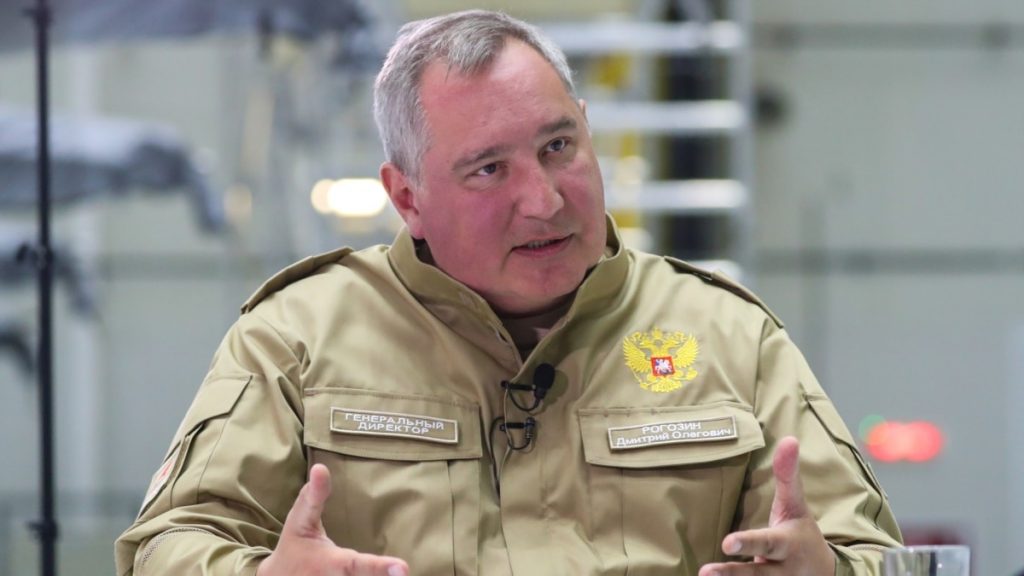
On Wednesday, December 21, during the celebration of his 59th birthday, the former head of Roscosmos, Dmitry Rogozin, along with his guests, came under artillery fire, resulting in several guests, including Rogozin himself, being injured. Later, there was a message about the death of three people, among whom were the guards and assistants of Rogozin and the so-called chairman of the government of the self-proclaimed “DPR” Vitaly Khotsenko. Later it became known that both Rogozin and Khotsenko were injured and were promptly taken to the Rostov region and later to Moscow.
On December 23, it became known that Dmitry Rogozin received a concussion and shrapnel due to the shelling of the Shesh-Besh restaurant and hotel complex located on the banks of the Donetsk reservoir wound above the right shoulder blade. Also, according to available information, Rogozin allegedly lived in this institution over the past few months. In the Donbas, he leads a group of military-technical advisers, the Tsarskie Wolves (as they call themselves), based in the self-proclaimed “DPR”, a group of military-technical advisers. Also, several sources called Rogozin one of the leading contenders for a leadership position in the new district of the Russian Federation, which they allegedly want to create in the occupied territories of Ukraine.
Conclusions and outlooks:
Of course, the injury of Dmitry Rogozin demonstrates several essential aspects at once. Firstly, at the event, where only the close circle of the ex-head of Roskosmos was present, there was a mole who handed over information to the Ukrainian side. This speaks not only of a serious problem with information leaсkage but also of internal competition, which spreads even at the highest level and demonstrates the priority of commercial interests in the functioning of the so-called “republics”. We are not talking about ideological or political values. Each appointed leader in the occupied territories considers them from the point of view of obtaining superprofits and not from the point of view of helping and protecting the Russian-speaking population. In any case, it is worth paying tribute to the Ukrainian special services, actively developing an agent network behind enemy lines.
Secondly, information is being actively discussed in Russia that several Western PMCs are operating on the Ukrainian side, which is engaged in targeted special operations to eliminate individual political leaders or war criminals. Their activities, among other things, are attributed to the launch of drones deep into the territories of the Russian Federation (Engels airfield in the Saratov region, recent explosions near Ryazan, and more). At the same time, the involvement of the Israeli Mossad in the operation to eliminate Rogozin is being actively discussed in Russia. Allegedly, the representatives of Israeli intelligence transmitted information to the Ukrainian military with accurate data, which made it possible to achieve the goal. Given that Israel is officially trying to maintain a neutral position concerning Ukraine, such information can be deliberately promoted by Moscow to justify strengthening relations with Iran and strengthening joint positions in the region.
Thirdly, the fact of the shelling of the actual centre of Donetsk, which is officially confirmed by the Ukrainian side, Russia will most likely use to ensure other similar shelling. In recent months, Donetsk has been subjected to rocket and artillery attacks almost daily, but none of the parties takes responsibility. This case may become a precedent that allows blaming the Ukrainian side.
Fourthly, it is absolutely no coincidence that in Russia, they focus on the fact that the shelling of the Shesh-besh restaurant and hotel complex was carried out from the French Cesar artillery mount. This fact will become an additional element of pressure on Macron, who is trying in every possible way to establish himself as the primary negotiator to resolve the Ukraine situation and restore economic relations between Russia and the EU.
Fifthly, for all the emptiness and arrogance of the figure of Dmitry Rogozin, he is a media face, recognizable and symbolic. Sacred victims are often obtained from such persons – they are not sorry, and nothing depends on them. Still, any emergency with their participation (with or without a fatal outcome) becomes a loud informational occasion.
Sixthly, in this situation, there was the irresponsibility of Rogozin himself, who decided to magnificently cancel the birthday party in a restaurant in Donetsk, setting up and setting up many responsible persons, in particular, the “premier of the DPR” Vitaly Khotsenko – a figure much more powerful in the informal Russian hierarchy, than Rogozin himself.
In any case, it can be assumed that shortly, Rogozin will not return to the occupied territories of Ukraine. This case will be a lesson for all Russian politicians who are trying to promote themselves by visiting Ukrainian cities under temporary occupation.
6. Results of the year by Dmitry Medvedev
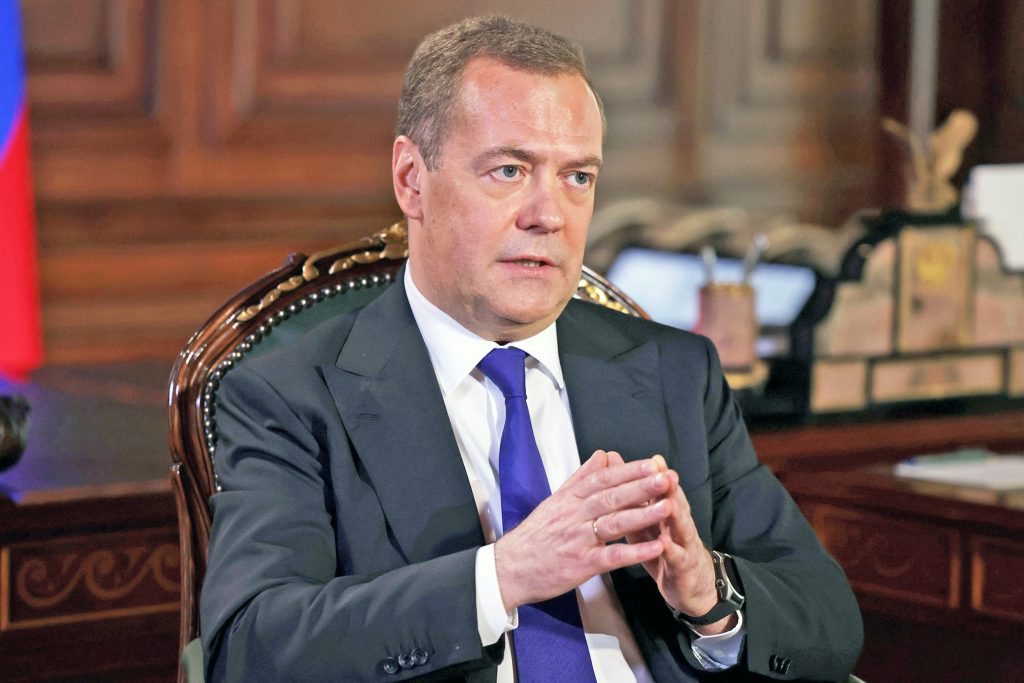
On Sunday, December 25, Deputy Chairman of the Security Council of the Russian Federation, Dmitry Medvedev, published his new article. In it, he summed up the outgoing 2022. Once again, he noted changes in the global world order, criticised international institutions that, in his opinion, do not cope with their tasks, and also made some statements, apparently demonstrating Russia’s plans for the next year:
Key theses:
- “Our world has changed, and this is forever. And the main thing that needs to be understood is where he is moving now and with us. What future begins today? What can we expect? And most importantly – how to act.
- “The decision to launch a ‘special military operation’ in February 2022 was a difficult, forced step under the pressure of circumstances. It was not only about protecting the fraternal “republics” of Donbas but also about the security and sovereignty of Russia itself. Let’s face it – about her survival. It was impossible to delay any further. This became obvious at the end of 2021 when the North Atlantic Alliance refused to guarantee that Ukraine would not join NATO. And the “Ukrainian drug addicts” announced their desire to revive the nuclear arsenal.”
- “The special operation is a continuation of our long-standing uncompromising struggle against bastard neo-fascism and nationalism in all its manifestations.”
- “The saddest outcome of not even a year, but decades that have passed since the collapse of the Soviet Union, is that Western states have completely forgotten the lessons of World War II.”
- “Alas, now we have no one to speak and negotiate with the West, there is nothing to talk about, and there is no need to.”
- “For years, maybe decades ahead, normal relations with the West can be forgotten. It is not our choice. Let’s do without them until a new generation of reasonable politicians comes to power there. Let’s be careful and vigilant. We will develop relations with the rest of the world. Fortunately, it is pervasive and treats us normally.”
- “The limits of traditional decency after the introduction of illegal, absolutely boorish sanctions against our country should no longer limit us in any way in the choice of methods of protection.”
- “It is impossible to trample on Russia, and with it, the Russian World, split it or subdue it to someone else’s will. The lascivious hands of the Anglo-Saxons and other countries “sworn to darkness” were short even in the most difficult times for us. It won’t come out now.”
- “There is a global ideological and philosophical collapse of the Western worldview, its model of the world order.”
- “The main problem is that the West is destroying the fundamental principles of a market economy with its own hands – without which one can forget about one’s the development and partnership with anyone.”
- “Things must be called by their proper names: the USA professes neo-colonialism, the unrestrainedness of which would make even R. Kipling blush and take a back seat with his “white man” arrogance”.
- “Several macro-regions are emerging in the world, each with its own internal rules and logic of development, but tuned to partnership and dialogue, not to confrontation”.
- “New disarmament agreements are currently unrealistic and unnecessary. The sooner the maximum security guarantees that suit our country are received, the sooner the situation will normalise.”
- “The world will continue to balance on the edge of World War III and nuclear disaster. We will do everything to prevent them.”
- “Our task is to protect new territories within the Russian Federation shortly and make their lives prosperous, safe, and comfortable.”
- “Our enemies failed to destroy our economy. Huge work is underway in the economic sphere, aimed at restarting the most important industries that ensure the security and defence of the country.”
- “The main and indisputable. “We don’t abandon ours!” – has become the motto of the outgoing year.
Conclusions and outlooks:
In his article, Medvedev, as before, does not skimp on eloquent statements that fuel aggressive moods against everything Western and everyone who thinks differently from what is customary in Russia.
Recently, Dmitry Medvedev has again begun to sculpt the figure of the Successor. But if in 2008 Medvedev was presented to the world as a liberal alternative to Putin, now he is a more conservative and aggressive copy of Putin, threatening peace and supporting the war to a victorious end. Medvedev goes to China and writes policy articles. Putin continues his policy: “I will show you Russia without Putin. Do you like it?”. If for domestic consumption, for the Russian layman, “Russia without Putin” is Ukraine, then for the external consumer, “Russia without Putin” is Medvedev.
His results of the year in the main mouthpiece of the Russian authorities are almost the exact “sacred” text as the president’s New Year’s speech – it can be deciphered and read between the lines. And there, it is written that the war against Ukraine will continue, and the confrontation with NATO will also be a reality for the next year and possibly decades. Medvedev’s article can be called the “Manifesto of the Kremlin hawks.” Unfortunately, the “Kremlin doves manifesto” is unlikely to appear shortly.
It is also important to note that Medvedev’s article was published after he visited China, which most likely indicates that such a policy was agreed upon with Beijing. Apparently, Xi Jinping demonstrates tacit agreement with Moscow’s plans to escalate relations with the West further. Unfortunately, such a sign is not positive for Ukraine.

